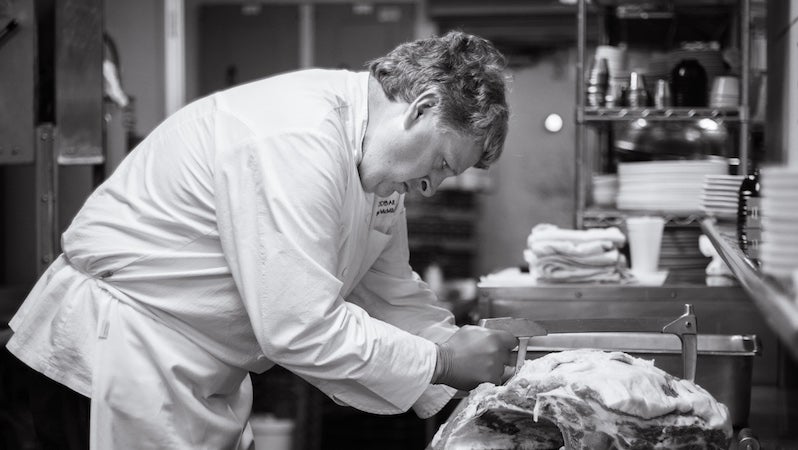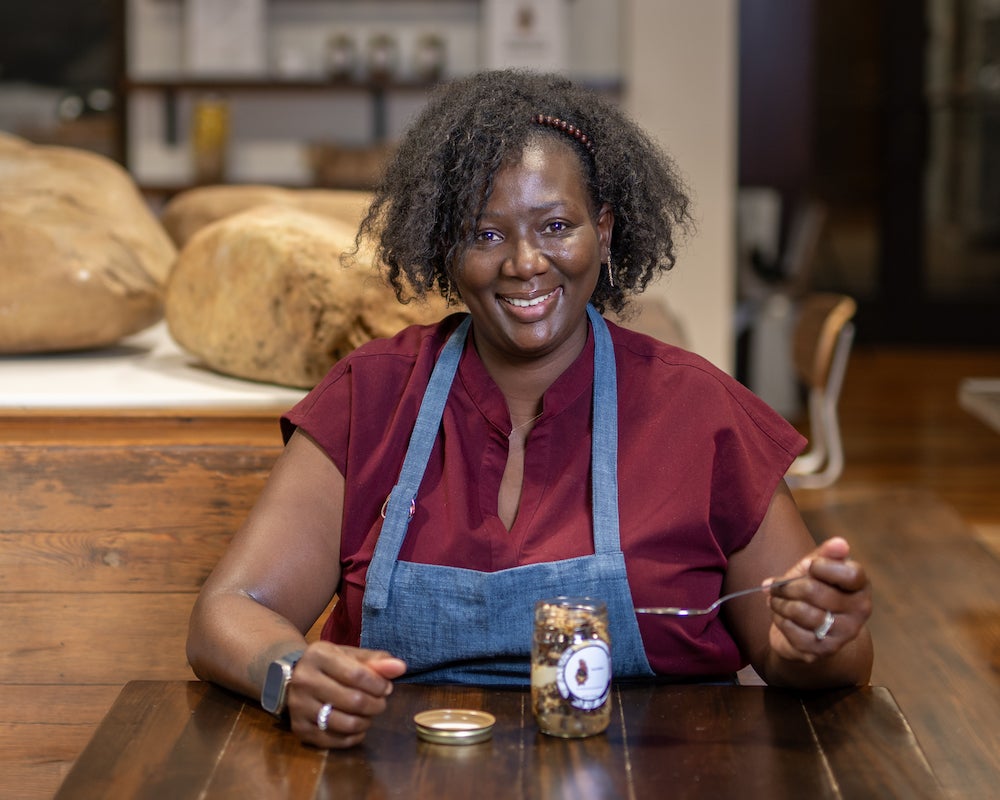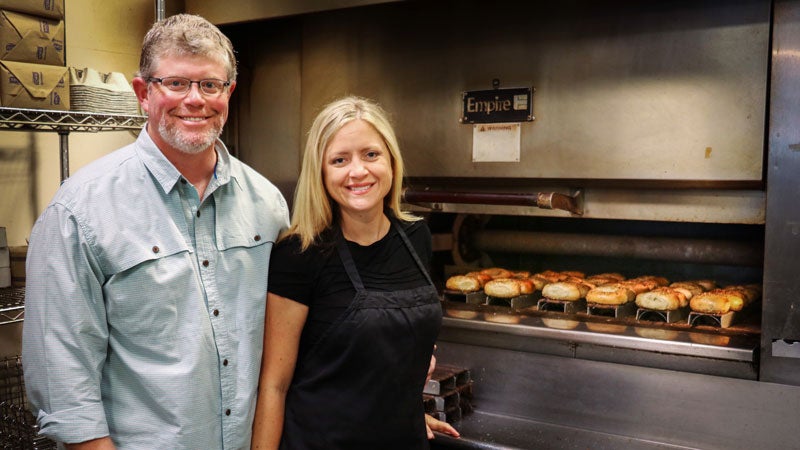By Rick Lewis
FoodBar Chef George McMillan carries himself with a certain casual effortlessness, a subtle confluence of both skill and practice. But then again, it should come as no surprise that he’s right at home in a kitchen—he’s been at the dining game for more than 26 years. His resume includes places both locally and nationally acclaimed: Arman’s at Park Lane (where he would meet his wife, Meredith), Hot and Hot Fish Club and Daniel George.
But when asked about where he earned his love of food and the people that make it, he harkens back to his upbringing in Birmingham: “Both my grandmothers were great cooks.” His father’s mother, Jean McMillan, was a traditional Southern inspired “down-home kind of cook” and his mother’s mother, Louise Dial, a “little bit more gourmet, European influenced.” There was also Clara Frisco, who worked for the family, and her masterful soul food creations. And family friend David Apperson, a retired Navy cook, “saw the cuisines of the world” and taught McMillan to think more globally in terms of flavor.
It was among this diverse group of food lovers and creators that McMillan first found a desire to try his own hand at cooking. When the weekend came around and he and his sister were left to fend for themselves, he remembers trying to prepare the perfect breakfast, “making sure everything was hot at the same time.”
McMillan would keep his love of food into his more obligatory year spent at Auburn University. Not finding anything especially captivating in academia, he went on to work in a series of kitchens before ending up at the Jefferson State culinary school, an apprenticeship-like program consisting of two years of schooling and three years of work. He encourages all young people interested in the food industry to try out the “school of hard knocks” method to make sure it’s really the life they wish to pursue. But he couldn’t be happier in his choice.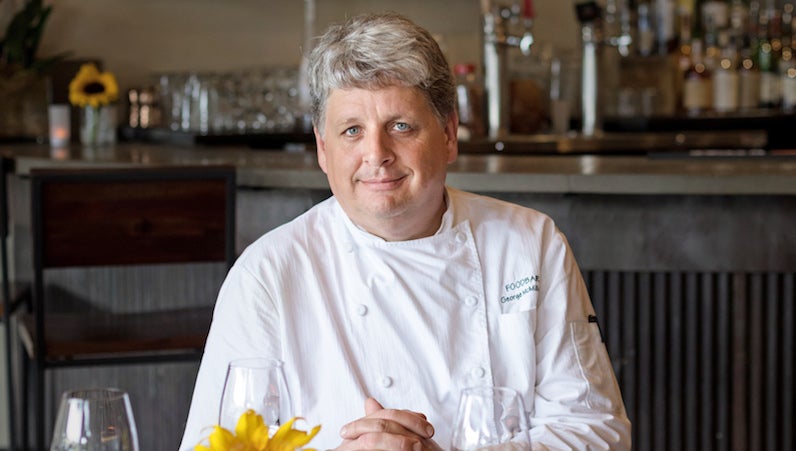
Finding one’s passion is somewhat akin to always finding the perfect skipping stone, and in 2013, McMillan tossed his into Cahaba Heights and opened FoodBar, his long-awaited solo venture. According to McMillan, a lot of what FoodBar aims to do is “work with local farmers and purveyors and sort of follow the sun and seasons.” His restaurant, a turn away from white tablecloths, embraces the upscale-casual approach and leans into the warm comfort of dark woods and soft leather booths.
The walls are decorated with pictures of vintage Alabama, a painting of a bass and a healthily stocked wine rack. You’ll find a menu at once upscale and unpretentious—traversing from seared foie gras to an award-winning hamburger (Miller Farms organic beef, caramelized onions and a Parmesan crisp). “I have customers that’ll call and say, ‘Hey, I’m wearing shorts,’” McMillan says. “I don’t care if you’re wearing flip flops and a bathing suit, come on in.”
For FoodBar, highlighting Alabama’s bounty is no small task, with all of its fields, rivers and gulf ripe for the picking. But it’s the search for the best ingredients that McMillan is intrinsically drawn toward; he says if he wasn’t a professional chef he’d be a professional hunter.
He’s a chef who knows the soil as well as the market, and his list of suppliers reads like a who’s who of Alabama’s farming pros: Columbiana’s Southern Organics for hydroponically grown microgreens naturally filtered by tilapia; Delta’s Miller Farms grass fed beef; Madison’s Henry Fudge, famous for his fostering of heritage-bred duroc pork; and numerous docks in South Alabama supplying snapper, oysters and a whole host of fresh Gulf seafood.
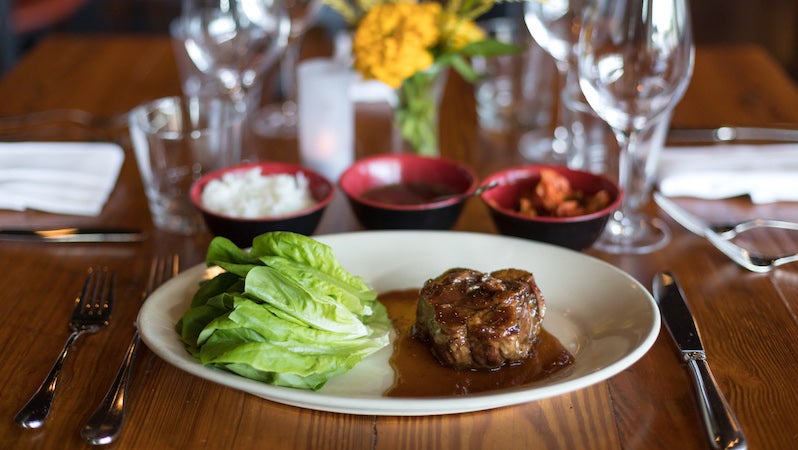 Of course, McMillan’s true art is the fashioning of these prime ingredients into tantalizing meals that not only play to Southern comfort but also to the increasingly global palate of today’s customer. For example, in a meal that riffs off the idea of barbecue and the freshness of greens, Chef McMillan makes a Fudge Farms lacquered pork roast served with a house-made kimchi, butter lettuce and sticky rice. McMillan credits the prevalence of travel and even the Food Network in “tearing down walls around certain foods or flavors,” unlocking culinary experiences people might not have considered before. But the early influence of family and Birmingham are not lost on McMillan—recipes from his grandmothers can frequently be found on the menu too.
Of course, McMillan’s true art is the fashioning of these prime ingredients into tantalizing meals that not only play to Southern comfort but also to the increasingly global palate of today’s customer. For example, in a meal that riffs off the idea of barbecue and the freshness of greens, Chef McMillan makes a Fudge Farms lacquered pork roast served with a house-made kimchi, butter lettuce and sticky rice. McMillan credits the prevalence of travel and even the Food Network in “tearing down walls around certain foods or flavors,” unlocking culinary experiences people might not have considered before. But the early influence of family and Birmingham are not lost on McMillan—recipes from his grandmothers can frequently be found on the menu too.
Of course, FoodBar would not be complete without a full bar to boot, and head bartender David Winter oversees an equally seasonal menu of classic and modern offerings alike. For the summer heat there’s a re-envisioned Aperol spritz made with elderflower liqueur and to ward off the night a whiskey cocktail featuring cold brew coffee and praline liqueur. The bar also features an eclectic offering of both local and domestic beers on tap and by the bottle as well as wine.
Now cruising into his seventh year with FoodBar, Chef McMillan says he enjoys being “a beacon for the city” and catering to customers new and old. The response to his approach has been consistent and strong, even through times of great uncertainty for the restaurant business as a whole. During the beginning heat of the COVID-19 pandemic, FoodBar only closed its doors for a few weeks. “We let everybody go home,” McMillan says. “(We) did our own house quarantines to make sure everybody was okay and safe.” They ran a take-out only business for about two months for opening back in earnest in June, and the response was immediate and welcome. According to McMillan, seeing people back in his establishment was “encouraging.” And if his sustained success is any metric to go by, he has no plans of slowing down.
 Toes in the Sand Summer Cocktail
Toes in the Sand Summer Cocktail
Classic inspirations are behind many of the drinks on FoodBar’s menu. This one traces its roots back to the ever-approachable Aperol spritz. A refreshingly cool, floral reprieve from the Alabama heat, this creation of bartender David Winter has the ability to transport you to the island you’d rather be lounging on.
What you’ll need:
- 1 ounce Tito’s vodka
- 3/4 ounce St. Germain Elderflower Liqueur
- 1/2 ounce Aperol
- 1/2 ounce fresh lemon juice
- 1/4 ounce simple syrup
- 2-4 thin slices of lemon for garnish
- Splash of Prosecco
How to make it:
Combine all liquid ingredients except Prosecco into a shaker tin. Add ice and shake vigorously for 10 seconds. Strain the liquid into a wine glass with the lemon slices placed inside and add ice. Finish off with a splash of Prosecco.
Editor’s Note: The cocktail photo that ran with this recipe in the August/September issue of Vestavia Hills Magazine was incorrect; the photo above is the correct photo of Toes in the Sand.

